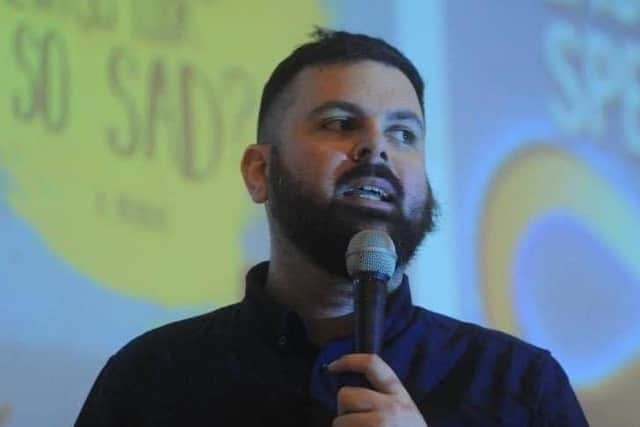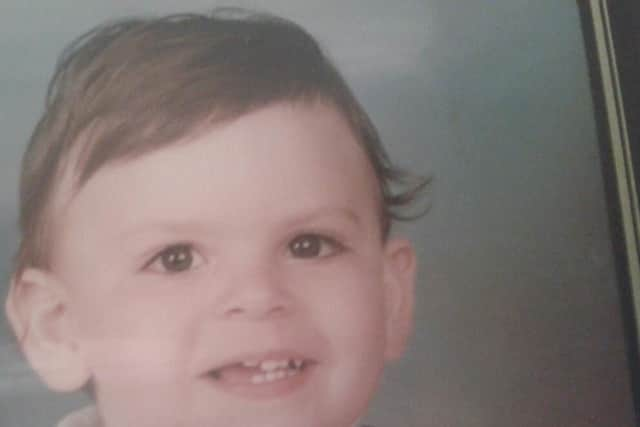Autistic Derry man changing how the world views autism
and live on Freeview channel 276
Jude has written three books, ‘Why Does Daddy Always look So Sad’, ‘Loving Your Place on the Spectrum’ and ‘The Ghosts of Riots Past’, which will be released in October. The 31 year old father of one aims to break down the sigma around autism and help autistic people to shape their own future, instead of conforming to a neurotypical world, while providing the support and guidance he needed when he was starting his own business.
Jude said: “I always knew I was different. I knew I wasn’t like other kids when I was wee. There’s this misconception that autistic kids have no idea of the world around them but I knew I wasn’t quite like everybody else. When I was in primary school, I was the only person to have an adult sitting beside them. My classroom assistant was with me everywhere I went except if I had to pee or eat. I didn’t know what it was called but I knew I played wrong. I used to line things up, and I still line my stationary up in my office desk. I didn’t like big crowded games and things so everything I did was wrong. It was all completely and utterly fundamentally wrong. But I didn’t know why. It was when I was 18 that my parents told me. There was more stigma around autism then so I don’t blame them for trying to shelter me a bit. There wasn’t people like me standing on a soapbox saying ‘being autistic is okay’ back in 2008.
Advertisement
Hide AdAdvertisement
Hide Ad“The process in the mid-90s was the same as it is now; parents believe their child is autistic, they have to wait on a waiting list for forever and a day and then go to public places where there’s someone standing in the top of the hall that tells them autistic children need to be taught communication skills, they need to be taught social skills, you should do this or that and being autistic is terrible. Then they tell parents to join their organisation and give them money. Fear always gets people to give their money.


“What I want to do now is tell parents that it’s alright to be autistic. My aim is to be the first port of contact and say that things can be alright. People are told that their child has ‘obsessive and repetitive behaviours’ but that has done well for me and people who need more support than I do. If it wasn’t for ‘obsessive and repetitive behaviours’, I wouldn’t have written my most recent book because it was that drive that had me throw myself into the research. Every autistic child should be treated with dignity. There’s training courses out there for parents and teachers to cope with the way I fundamentally am as a person. All these trainings now to teach autistic children social skills and other things, what’s the difference between that and the churches of centuries gone by teaching men how to deal with their hysterical wives? To me there’s no difference whatsoever.”
Jude gave a number of TED X talks on his life as an autistic person and the work he does, which are available on Jude’s website, www.judemorrow.com. He begins one of his talks using liking mustard as an analogy for autism.
“I wanted to give a ridiculous example. If you have 100 people in a room and two people don’t like mustard, would you think you need to come up with a therapy to help them? That’s what humans tend to do. The majority tends to come up with a therapy to help normalise the minority into the majority. That’s what happened with gay conversion therapy and, now, it’s happening with us. It’s happening through applied behaviour analysis or all this social skills training and stuff like that. It’s okay not to like mustard and it’s okay to be autistic, it’s okay to be gay. It’s okay to be you.
Advertisement
Hide AdAdvertisement
Hide Ad“I was a social worker for nine years and I had no expectations, other than wanting to have a book published by the time I was 30. The first book came out and it really took off. That’s when people started reaching out to me telling me that they were experiencing the same thing and I realised that nothing really changed in the world. I set about doing training and consultancy a few years ago and I spent a fortune trying to set it up because I thought I needed to get mentorship, marketing and PR and things like that. It did eventually take off and we have partners all over the world. Now, the world’s largest autistic-led training and consultancy firm is based in Derry and we have helped to build and scale multiple multi-million pound businesses over the past few years. Really, the main thing that I want to do with my business is to help any neurodivergent person to set up their own business. You see all these initiatives for autism in the work place or hiring autistic people and instead of trying to be a square peg in a round hole, just make your own hole.”


Jude is has just finished writing his third book ‘The Ghosts of Riots Past’, an historic novel about a fictional volunteer in the Order of Malta volunteer during the troubles. The book will be launched on October 27 in the Ballroom of the City Hotel.